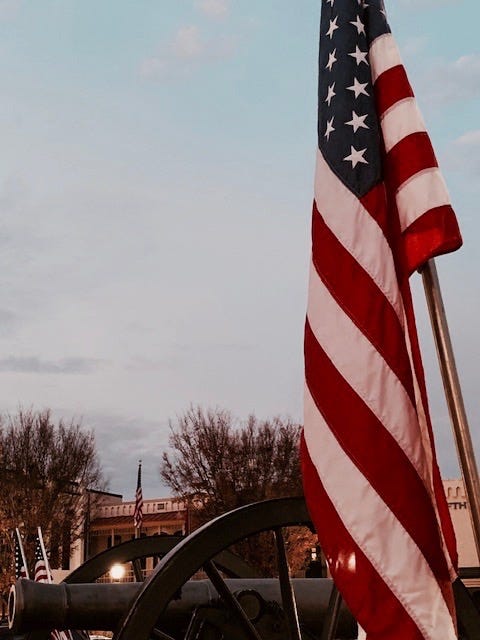Scripture for Meditation: “For the battle is not yours, but God’s.” (2 Chronicles 20:15)
The evolution of one of our great nation’s most patriotic songs is ultimately a story about revision and rebirth — the story of America itself.
Like so many songs in the folk tradition, the “Battle Hymn of the Republic” — ultimately penned in 1862 — evolved over several decades. The tune was birthed as a hymn at revivalist camp meetings during the late 1700s / early 1800s and was reportedly adapted by William Steffe in 1856. The melody also morphed into a popular wartime song, “John Brown’s Body,” whose lyrics were written by the 2nd Infantry Battalion of the Massachusetts militia (aka “The Tiger Battalion”) in May 1861, at the very start of the Civil War (1861-1865). While the Tiger Battalion’s version was reportedly intended as a witty play on names between one of its own soldiers and the famous abolitionist John Brown, the song lyrics were considered crude at best.
Fast forward to a few months later…
In November 1861, the writer and abolitionist Julia Ward Howe, along with her husband Dr. Samuel Gridley Howe, came to Washington, D.C. and met President Lincoln at the White House. Julia reflected on the meeting in her memoirs published in 1899, noting that she was moved “by the sad expression of Mr. Lincoln’s deep, blue eyes.”
During the same visit, the couple, along with the Reverend James Freeman Clarke, were touring Union army camps near Washington, D.C. where they heard the troops singing “John Brown's Body.” The Reverend remarked to Julia that she should write new lyrics to the popular tune. And so, that evening, Julia and her husband returned to the Willard Hotel in Washington, D.C. According to her memoirs:
I went to bed that night as usual, and slept … quite soundly. I awoke in the gray of the morning twilight; and as I lay waiting for the dawn, the long lines of the desired poem began to twine themselves in my mind. Having thought out all the stanzas, I said to myself, ‘I must get up and write these verses down, lest I fall asleep again and forget them.’ So, with a sudden effort, I sprang out of bed, and found in the dimness an old stump of a pencil which I remembered to have used the day before. I scrawled the verses almost without looking at the paper.
Those inspired words became a poem, “Battle Hymn of the Republic,” published in Atlantic Monthly in February 1862. Together with the 1856 “Glory Hallelujah” version of the tune edited by William Steffe, they comprised the lyrics of the song that we know and love:
“Mine eyes have seen the glory of the coming of the Lord;
He is trampling out the vintage where the grapes of wrath are stored;
He hath loosed the fateful lightning of His terrible swift sword;
His truth is marching on.
Glory! Glory! Hallelujah! Glory! Glory! Hallelujah!
Glory! Glory! Hallelujah! His truth is marching on.
…
In the beauty of the lilies Christ was born across the sea,
With a glory in His bosom that transfigures you and me:
As he died to make men holy, let us live to make men free,
While God is marching on.
Glory! Glory! Hallelujah! Glory! Glory! Hallelujah!
Glory! Glory! Hallelujah! While God is marching on.”
As the Museum of the Bible notes, “These words, inspired by and drawing from the Bible, became the battle cry of a nation at war.”
An anthem born in darkness about freedom for all men and a celebration of the glory of God, “Battle Hymn of the Republic” is an eternal song. During the Civil War, Julia’s version became popular among the Union soldiers and was known to be the favorite song of President Abraham Lincoln himself.
Remarkably, nearly a century later, in April 1968, the very last words that the great Martin Luther King Jr. spoke in public (the night before he was assassinated in Memphis) were:
“Mine eyes have seen the glory of the coming of the Lord.”
These words echo throughout eternity, and ring true today more than ever. His truth is marching on…
Select Links:
https://www.battlefields.org/learn/primary-sources/civil-war-music-battle-hymn-republic
https://www.loc.gov/item/ihas.200000003/#:~:text=But%20it%20was%20when%20Julia,heard%20the%20troops%20go%20into
https://en.wikipedia.org/wiki/Battle_Hymn_of_the_Republic#cite_note-11
https://en.wikipedia.org/wiki/John_Brown%27s_Body#cite_note-Kimball-1
https://www.voanews.com/a/popularity-of-lincolns-favorite-hymn-endures/1551846.html
Photo Credit: Stephanie Augusta Bento
© Stephanie Augusta Bento, House of Riverenza, 2024.




